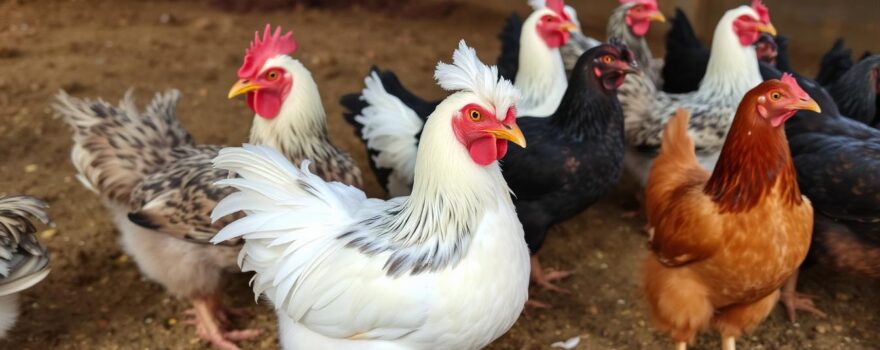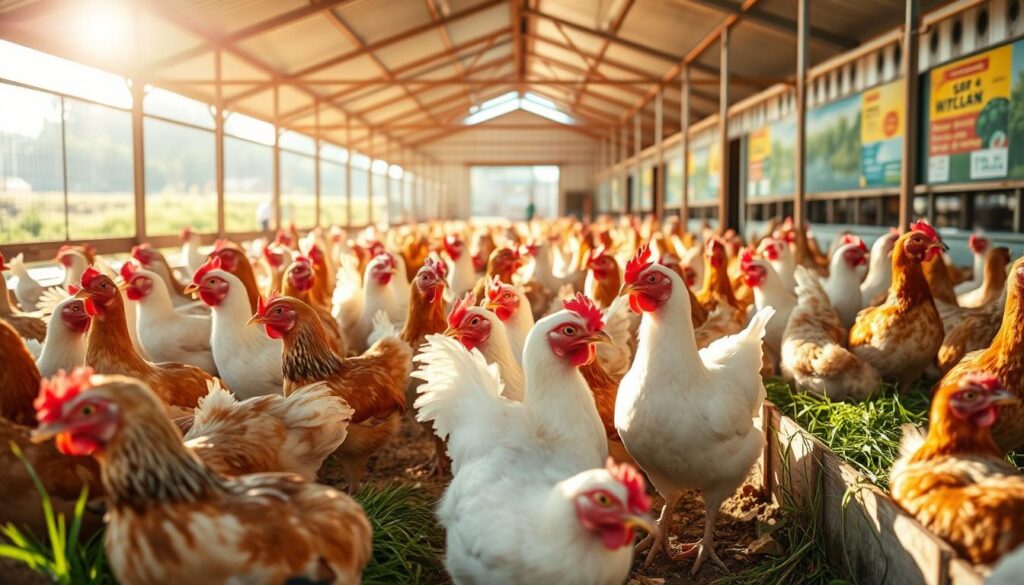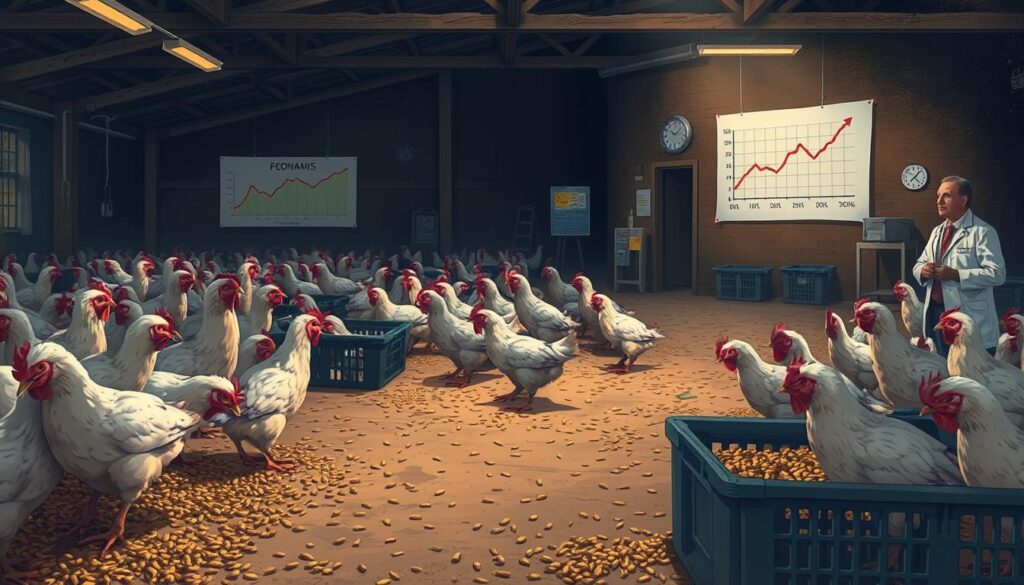
Coccidiosis is a common disease in broiler chickens. It causes big economic losses for those who raise poultry. This disease is caused by Eimeria protozoa and can really hurt a chicken’s health and growth. We will look at what causes coccidiosis, its symptoms, how to diagnose it, and how to treat it. We will also talk about how to prevent and control this serious issue in poultry.
Key Takeaways
- Coccidiosis is a common intestinal disease that affects broiler chickens, caused by Eimeria protozoan parasites.
- The disease can lead to significant economic losses due to poor weight gain, reduced feed conversion ratio, and even high mortality rates in broiler flocks.
- Understanding the causes, symptoms, and impact of coccidiosis is crucial for effective prevention and control strategies.
- Proper diagnosis, through methods like fecal oocyst examination and postmortem analysis, is essential for implementing appropriate treatment and management practices.
- A combination of biosecurity measures, anticoccidial drugs, and vaccination can help poultry producers effectively control and prevent coccidiosis outbreaks.
Understanding Coccidiosis in Broiler Chickens
Coccidiosis is a common and costly disease in broiler chickens. It affects their intestines. The Eimeria parasite causes it, hitting the poultry industry hard.
What is Coccidiosis?
Coccidiosis is a disease of the intestines caused by Eimeria parasites. These parasites harm the lining of broiler chickens’ intestines. This leads to digestive and production problems.
Importance of Coccidiosis in the Poultry Industry
Coccidiosis is a major problem in the poultry industry. It causes big losses by slowing growth, wasting feed, and raising death rates. Managing this disease is key to keeping broiler chickens healthy.
| Key Facts about Coccidiosis in Broiler Chickens |
|---|
|
Knowing about coccidiosis and its big impact on the poultry industry is vital. It helps in creating good plans to fight this disease and keep broiler production strong.
Causes of Coccidiosis in Broiler Chickens
Coccidiosis is a common disease in poultry. It’s caused by tiny parasites called Eimeria. These parasites live in the intestines of broiler chickens. This leads to big health and production problems for the poultry industry.
The main reasons for coccidiosis in broiler chickens are:
- Contaminated Environment – Eimeria species are found in the poultry environment. They are in contaminated feed, water, or litter.
- Direct Transmission – Broiler chickens get coccidiosis by eating Eimeria oocysts. These are the infectious stage of the parasite from the environment.
- Stress Factors – Overcrowding, poor sanitation, and changes in temperature or humidity weaken the birds. This makes them more likely to get coccidiosis infections.
Knowing the main causes of coccidiosis is key to preventing and controlling it in broiler chicken production. By tackling the factors that spread this disease, poultry producers can keep their flocks healthy. This improves productivity and profitability.
“Coccidiosis is one of the most economically significant diseases affecting the poultry industry worldwide, with an estimated annual cost of over $3 billion.”
Symptoms of Coccidiosis in Broiler Chickens
Coccidiosis is a common disease in broiler chickens. It shows through various symptoms. One key sign is bloody diarrhea, caused by intestinal damage. Infected chickens may also eat less and gain weight poorly, hurting their performance.
Clinical Signs of Coccidiosis
The signs of coccidiosis in broiler chickens depend on the infection’s severity and the Eimeria species. Common signs include:
- Watery, bloody diarrhea
- Lethargy and reduced activity
- Ruffled feathers and huddling together
- Decreased feed and water consumption
- Pale or yellowish skin and mucous membranes
Impact on Flock Performance
Coccidiosis greatly affects a broiler flock’s performance. It can cause poor weight gain, a bad feed conversion ratio, and higher mortality rates. In severe cases, it can lead to big economic losses for poultry farmers.
“Coccidiosis is one of the most common and economically significant diseases affecting broiler chickens. Early detection and proper management of the disease are crucial for maintaining flock health and productivity.”
Coccidiosis in Broiler Chickens: Causes, Symptoms, and Treatment
Coccidiosis is a common disease in poultry that affects broiler chickens. It can harm their health and reduce their productivity. This section will explore the causes, symptoms, and treatments for this disease.
Causes of Coccidiosis
Coccidiosis in broiler chickens is caused by Eimeria, a type of protozoan parasite. These parasites attack the birds’ intestines, causing health problems. The disease spreads quickly in dirty, crowded areas with stressed birds.
Symptoms of Coccidiosis
The symptoms of coccidiosis in broiler chickens vary with the severity of the infection. Common signs include:
- Diarrhea, which may be bloody or contain mucus
- Reduced appetite and weight gain
- Lethargy and weakness
- Ruffled feathers and pale comb and wattle
- High mortality rates in severe cases
Treatment and Management
Quick diagnosis and treatment are key to managing coccidiosis in broiler chickens. Vets often prescribe drugs or medicated feed to fight the infection. Keeping the poultry house clean and disinfected also helps prevent the disease.
“Early detection and management of coccidiosis are essential to minimize the impact on broiler chicken performance and overall flock health.”
Understanding coccidiosis helps poultry producers protect their chickens. They can keep their flocks healthy and productive by taking these steps.
Diagnosis of Coccidiosis in Broiler Chickens
Getting a correct diagnosis of coccidiosis in broiler chickens is key. Veterinarians and poultry farmers use two main methods: fecal oocyst examination and postmortem examination. These help find out which Eimeria species is causing the problem, leading to the right treatment.
Fecal Oocyst Examination
The fecal oocyst examination is a common tool for diagnosing coccidiosis. It involves checking a chicken’s feces for Eimeria oocysts, the parasite’s infectious stage. This test shows how bad the infection is and which Eimeria species is involved.
Postmortem Examination
Postmortem examination also plays a big role in diagnosing coccidiosis. A vet or expert checks the chicken’s internal organs, especially the intestines, for signs of Eimeria infection. They look for lesions, hemorrhages, or other signs of coccidiosis.
By combining fecal oocyst examination and postmortem examination, we get a full picture of coccidiosis. This helps poultry producers use the best treatments and management to keep their flocks healthy and productive.
Prevention and Control Strategies
Managing coccidiosis in broiler chickens needs a strong plan. It’s important to use good biosecurity and anticoccidial drugs or vaccines. These steps help fight this big problem in the poultry world.
Biosecurity Measures
Keeping the farm clean is key to stopping coccidiosis. This means:
- Keeping the chicken house clean and disinfected often.
- Limiting who comes in to stop Eimeria species from getting in.
- Ensuring good drainage and litter to stop oocysts from spreading.
- Controlling pests and rodents to stop coccidiosis from spreading.
Anticoccidial Drugs and Vaccination
Using drugs or vaccines also helps fight coccidiosis in chickens.
| Anticoccidial Drugs | Vaccination |
|---|---|
|
|
These methods lower the chance of coccidiosis outbreaks. They also help keep chickens healthy and productive.

“Implementing a comprehensive coccidiosis management program is essential for maintaining the health and productivity of broiler flocks.”
Management Practices for Coccidiosis Control
Effective management practices are key to controlling coccidiosis in broiler chickens. A good approach to coccidiosis control in poultry production involves several strategies. These target different stages of the disease lifecycle.
Litter management is crucial. Keeping litter dry and well-ventilated helps reduce Eimeria oocysts. Regular litter removal and house disinfection break the disease cycle.
It’s also important to ensure high-quality feed and water. Clean water and a nutritious diet boost the immune system of broiler chickens. This makes them more resistant to the disease.
Environmental monitoring is also vital. Regular flock inspections and diagnostic tests help spot coccidiosis early. This allows for quick treatment and control.
By using these management practices, broiler chicken producers can control coccidiosis. This improves flock performance and overall poultry production.
Economic Impact of Coccidiosis in Broiler Production
Coccidiosis is a big problem for broiler chickens. It affects the poultry industry a lot. It leads to less growth, less feed efficiency, more deaths, and more losses in production.
The disease makes broilers eat more feed to gain weight. This means higher feed costs and lower profits for farmers. Also, coccidiosis can cause more birds to die, making the economic loss even bigger.
| Factor | Impact on Broiler Production |
|---|---|
| Feed Conversion Ratio | Decreased due to reduced feed efficiency |
| Mortality | Increased due to disease-related deaths |
| Production Losses | Reduced overall broiler production and profitability |
The economic impact of coccidiosis is huge. It’s estimated to cost the global poultry industry billions of dollars each year. To fight this, using drugs and vaccines is key. It helps keep broiler production profitable.

“Coccidiosis is one of the most economically significant diseases in the poultry industry, and its impact on broiler production cannot be overstated.”
As the poultry industry grows, fighting coccidiosis is vital. It keeps the industry strong and profitable.
Emerging Trends and Research
The poultry industry is always looking for new ways to fight coccidiosis. This disease is a big problem for bird health and how well they do. They’re focusing on novel anticoccidial compounds to find better ways to control it.
Novel Anticoccidial Compounds
Scientists are looking into new compounds and natural products to stop Eimeria growth. These new agents come from plants or microbes. They might work better and not make birds resistant to treatments.
This is important as the industry moves away from antibiotics. These new compounds could help keep birds healthy and manage coccidiosis better.
Vaccine Development
The poultry industry is also working on vaccine development for coccidiosis. They’re making vaccines that can give birds a strong defense. This could mean less need for medicines and better health for birds.